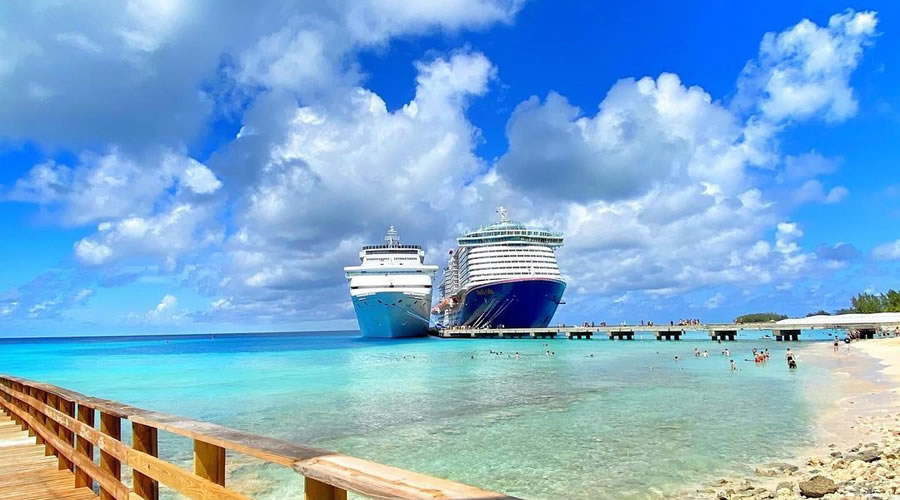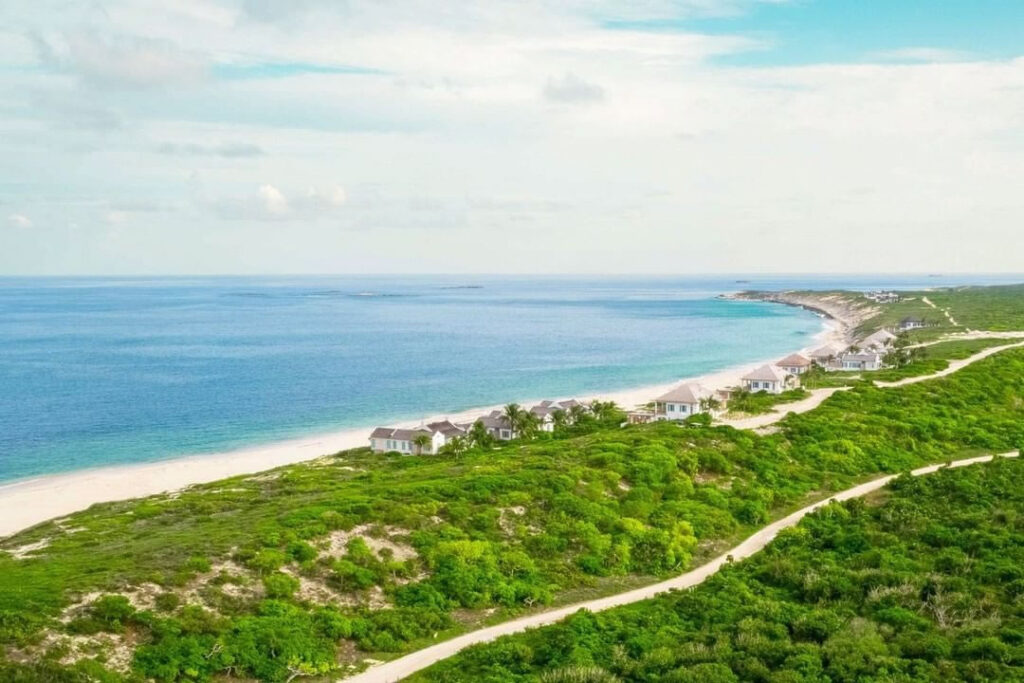
The Turks and Caicos Islands, often simply referred to as TCI, are situated in the Atlantic Ocean. Despite their location, they are traditionally considered part of the Caribbean region. These islands are strategically located 575 miles southeast of Miami, Florida. They lie to the south of the Bahamas, to the east of Cuba, and to the north of Hispaniola, which comprises the countries of the Dominican Republic and Haiti.
The archipelago consists of over 40 islands and cays. However, only nine of these are inhabited. These nine islands are further divided into two main groups:
- Turks Islands: Located to the east of the Turks Island Passage.
- Caicos Islands: Situated to the west.
The nine inhabited islands are as follows: Grand Turk; Providenciales; South Caicos; Salt Cay; Middle Caicos; North Caicos; Parrot Cay; Pine Cay; and Ambergris Cay.
Turks And Caicos Fact Sheet
TCI Tourism
Brief History
The history of the Turks and Caicos Islands is rich and varied. The islands were initially inhabited by the Taino and Lucayan Indians for approximately 700 years. These indigenous populations primarily settled in Middle Caicos and Grand Turk. However, their civilization vanished shortly after the arrival of Christopher Columbus in 1492.
The islands then witnessed the emergence of the salt-making industry, with Bermudians arriving to rake salt and transport it back to Bermuda. Over the years, the islands changed hands multiple times, being controlled by the Spanish, French, and British. They were even briefly a haven for pirates and British Loyalists fleeing the American Revolution. The islands’ political status shifted several times, from being part of the Bahamas colony to becoming dependencies of the British Crown Colony of Jamaica. When Jamaica gained independence in 1962, the Turks and Caicos became a separate British Crown colony, a status they retain to this day.

Culture and Identity
Cultural Influences
The culture of the Turks and Caicos Islands is a blend of African, European, and indigenous Taino influences. The African influence is primarily due to the descendants of African slaves brought to the islands during the colonial era. European influences, especially British, are evident in the islands’ governance, education system, and some traditions.
Music and Dance
Music and dance play a significant role in the cultural life of the Turks and Caicos Islands. Traditional music genres include “Ripsaw” or “Rake n’ Scrape,” characterized by the use of a handsaw as a musical instrument. The islands also have their own unique dances, such as the “Junkanoo,” a street parade with music, dance, and costumes that occurs on Boxing Day and New Year’s Day.
Festivals and Celebrations
The Turks and Caicos Islands host several festivals throughout the year. The most notable is the Turks and Caicos Conch Festival, celebrating the islands’ national symbol and most famous delicacy. Another significant event is the Fisherman’s Festival, which honors the local fishing industry.
Culinary Traditions
The cuisine of the Turks and Caicos Islands is predominantly seafood-based, given its location. Conch, a type of marine mollusk, is a staple and can be prepared in various ways, such as conch salad, conch fritters, and conch chowder. Other popular dishes include grilled lobster, fish tacos, and johnnycakes.
Language and Literature
English is the official language of the Turks and Caicos Islands. However, the local dialect, known as “Turks and Caicos Creole,” is widely spoken among residents. This dialect is a blend of standard English and African linguistic elements. The islands have a rich oral tradition, with storytelling playing a vital role in preserving history and cultural practices.
Art and Craft
Art in the Turks and Caicos Islands is deeply influenced by its natural surroundings. Local artists often depict scenes of island life, marine life, and landscapes. Craftsmanship is also a significant aspect of the culture, with local artisans creating beautiful items from straw, shells, and other natural materials.
Values and Beliefs
The people of the Turks and Caicos Islands are known for their hospitality and warmth. Family and community are central to their way of life. The majority of the population is Christian, and religious beliefs play a crucial role in shaping values, customs, and traditions.

Practical Information for Visitors
- Currency and Banking. The US Dollar is the official currency of Turks and Caicos. Most hotels, restaurants, and taxi services accept traveler’s cheques, which can be cashed at local banks. Most major credit cards are accepted, and banks offer ATMs as well as cash advances on credit cards. Several international banks operate branches in the Turks and Caicos Islands, including FirstCaribbean International Bank, Royal Bank of Canada, and Scotia Bank. Typical banking hours are from 9:00 am to 3:00 pm, Monday to Friday.
- Population Statistics. The population of the Turks and Caicos was 42,953 in 2019, according to the Department of Statistics.
- Tipping Customs. Tipping is customary in the Turks and Caicos Islands. A service charge of 10-15% is often added to restaurant bills. However, if not included, a tip of 15-20% is standard. Tipping is also customary for taxi drivers, hotel staff, and tour guides.
- Time Zone and Electricity. The islands are in the Eastern Time Zone (ET). The standard voltage is 120V with a frequency of 60Hz. The power sockets used are of type B, similar to those in the United States.
- Climate and Weather. The Turks and Caicos Islands enjoy a tropical climate with warm temperatures year-round. The average temperature ranges from 85°F (29°C) during the day to 74°F (23°C) at night.
- Hurricane Season. The hurricane season in the Turks and Caicos Islands typically runs from June to November. Visitors are advised to monitor weather updates during this period and make necessary preparations.
People and Lifestyle
Origins and Ancestry of the Islanders
The original inhabitants of the Turks and Caicos Islands were the Taino people. Later, the islands were inhabited by descendants of African slaves brought over during the colonial era. Over time, a blend of these cultures, along with European settlers, formed the unique cultural identity of the islands.
Expatriate Communities
The Turks and Caicos Islands have seen a rise in expatriate communities, especially from the UK, Canada, and the United States. Many are attracted by the islands’ beauty, favorable tax regime, and investment opportunities.
Economy
Reliance on Tourism
Tourism is the primary driver of the economy in the Turks and Caicos Islands. The pristine beaches, coral reefs, and luxury resorts attract visitors from around the world. The tourism sector provides employment for a significant portion of the local population.
Real Estate and Seafood Exportation
The real estate market in the Turks and Caicos Islands has been booming, with many international investors and celebrities purchasing properties. Additionally, seafood, especially conch and lobster, is a significant export product, contributing to the islands’ economy.
Financial Services and Their Global Reach
The Turks and Caicos Islands have established themselves as an offshore financial center. The islands offer a range of financial services, including banking, insurance, and investment funds. The favorable tax environment and strict confidentiality laws make it an attractive destination for global investors.
Governance
British Overseas Territory Status
The Turks & Caicos Islands are recognized as a British Overseas Territory. Her Majesty the Queen appoints a Governor as her representative in the islands.
Local Governance: Premier and Elected Officials
The head of the Turks and Caicos Islands government is the politically elected Premier, formerly known as the Chief Minister. The Premier leads a team of elected officials who serve as representatives of various constituencies and Ministers of key sectors in the country. Elections are held every four years. The House of Assembly is located in the capital island, Grand Turk, with government offices and departments spread across the islands.
Legal System
The legal system of the Turks & Caicos Islands is founded on English Common Law.
Local Services and Amenities
Courier Services
Daily delivery service is available through FedEx, with offices in Providenciales and Grand Turk. DHL and UPS also provide services in the region.
Cable Television Providers
Satellite television service is widespread across the islands, offering most major American networks. Local providers include People’s Television (PTV) and Digicel Play.
Water Conservation
Fresh water in the islands is a precious resource, reliant on rainfall or desalinated water produced by reverse osmosis. Visitors and residents are encouraged to use water conservatively.
Telecommunication Services
The country code for Turks & Caicos is 649. Local and international telephone, internet, and cellular services are provided by FLOW and Digicel. Visitors from the USA can enable international roaming or rent/purchase a SIM card or phone from local providers.
Postal Services and Philatelic Bureaus
Post Offices are present on all inhabited islands, with all mail being air-transported. For stamp enthusiasts, various stamp issues and denominations are available for collection. Philatelic Bureaus are located on both Providenciales and Grand Turk.
Driving and Transportation Regulations
Visitors from the British Commonwealth Countries, the USA, Canada, and holders of International driver’s licenses can drive for up to 30 days using their respective licenses. Visitors from other countries must obtain a Visitors Permit from the Road Safety Department. Note: Public nudity is illegal throughout the islands.
Travel and Tourism
Entry Requirements and Travel Authorizations
All visitors must possess a valid passport to enter the Turks & Caicos Islands. Some countries, especially from the former Eastern Bloc, may require visas and should consult the nearest British Consulate Office. All visitors must have a round trip ticket. Visitors can stay for up to 90 days, with one-time renewal. From 22 July 2020, all travelers must obtain a travel authorization from the TCI Assured Travel Authorization Portal to enter the islands.
Air Travel
International commercial flights land at the Providenciales International Airport (PLS). Other domestic airports include JAGS McCartney International Airport in Grand Turk and several others on the Sister Islands. Direct flights connect PLS to major cities in the USA, UK, Canada, and some Caribbean countries. Inter-island travel is facilitated by local airlines like Caicos Express and InterCaribbean.
Sea Travel
Many visitors arrive via cruise ships. Grand Turk boasts a state-of-the-art luxury cruise ship center, which was awarded Best Caribbean Beach Port by Porthole Magazine in 2019. The islands are also a popular yachting destination with several marinas. Due to its proximity to Florida, the islands are considered a ‘gateway to the Caribbean’ for many mariners. Inter-island sea travel is available through the local ferry, TCI Ferry.
Health Care Facilities for Visitors
The national healthcare system includes two modern medical centers managed by InterHealth Canada: Cheshire Hall Medical Centre on Providenciales and Cockburn Town Medical Centre on Grand Turk. These centers offer a range of health services, including emergency care, dental, dialysis, and more. Telemedicine is also being introduced to enhance inter-island healthcare delivery. Providenciales also has several private general practitioners, and community clinics are available on the Sister Islands.
Banking Facilities for Tourists
Several international banks operate in the Turks and Caicos Islands, including FirstCaribbean International Bank, Royal Bank of Canada, and Scotia Bank. Banking hours are typically from 9:00 am to 3:00 pm, Monday to Friday.
The Turks and Caicos Islands offer more than just picturesque beaches and azure waters. As a British Overseas Territory, it boasts a robust governance structure and blends British traditions with local nuances. The islands’ infrastructure, from modern healthcare facilities to efficient telecommunication services, ensures that both residents and visitors experience comfort and convenience. The economy, driven by tourism, real estate, and financial services, reflects the islands’ global appeal. Whether you’re a traveler seeking a tropical paradise, an investor eyeing opportunities, or someone curious about island life, the Turks and Caicos promise a blend of natural beauty, cultural richness, and modern amenities.
